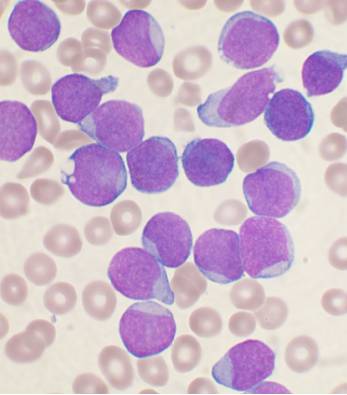
Acute lymphoblastic leukemia (ALL) is the most common childhood cancer in developed nations, affecting between 30 and 45 out of every one million kids. But not much is known about the genetics of the disease.
Two research groups set out to learn more by looking for common genetic variations associated with the disease. Their results, published online this week in Nature Genetics, provide new insight into the development of ALL.
British researchers led by Elli Papaemmanuil studied a total of 907 ALL cases and 2,398 controls with European ancestry. They identified three genetic variants associated with increased risk for the disease.
The strongest of these, , is near the IKZF1 gene, which encodes a protein involved in the development of white blood cells. Deletions of the region of DNA containing this gene are common in forms of ALL that have a poor prognosis. Each copy of a G at increases the odds of ALL by 1.69 times.
The second most strongly associated SNP was in ARID5B, a gene previously linked to a different form of blood cancer called acute promyelocytic leukemia. Each copy of a G at was associated with 1.65 times increased odds of ALL.
Finally, Papaemmanuil et al. found that each copy of a G at was associated with 1.34 times increased odds of ALL.
All three SNPs were even more strongly associated with ALL when the researchers restricted their analysis to a subtype of the disease called B-cell ALL. Within this form of the disease, in ARID5B seems to be highly associated with a further subtype called hyperdiploid ALL. This form of the disease has a better response to methotrexate chemotherapy than other subtypes of ALL.
The authors conclude that the variations they identified underlie approximately 64% of all cases of ALL.
“Our findings provide the first unambiguous evidence that common genetic variation influences the risk of developing pediatric ALL and strong rationale for searching for additional risk variants through further GWA [genomewide association] scans,” the authors write.
In a separate study of 441 ALL cases and 16,912 controls, Lisa Trevino and colleagues from the United States also found evidence for the involvement of variants in and around the ARID5B gene in B-hyperdiploid ALL. The riskier versions of SNPs closely related to were not only correlated with disease risk, but also with a response to methotrexate that at least partially underlies its greater efficacy in B-hyperdiploid ALL.
“The data…suggest that the same genetic variation that predisposes to B-hyperdiploid ALL may underlie the superior response of this subtype to chemotherapy. Thus, genomic variation may affect not only disease risk but treatment outcome as well,” they write.
Photo: VashiDonsk



